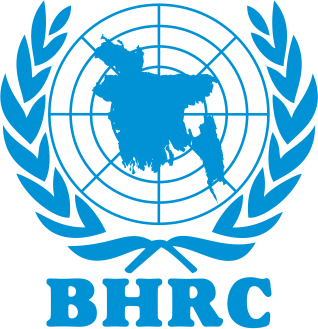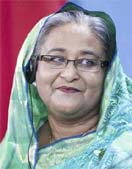

|
EDITOR
|
Editorial
‘Fortnightly’
পাক্ষিক |
|
|
2000 physicians, 6000 nurses to be recruited to combat COVID-19: PM

Human Rights Report
Prime Minister
Sheikh Hasina on 26 April said her government has
already initiated the process of appointing 2000
more physicians and 6000 nurses to ensure treatment
of the coronavirus infected patients.
"We are going to appoint more 2000 physicians and
6000 nurses at the quickest possible time to ensure
treatment of the coronavirus patients," she said
while exchanging views with the officials and public
representatives of the districts of Rajshahi
division over the COVID-19 situation through video
conference from her official Ganabhaban residence
here this morning.
She said the process to this end has already
started, adding that, "I myself has already made it
(the process of appointing more 2000 doctors and
6000 nurses) okay". The premier said doctors will be
recruited from those who have passed the BCS
examinations (earlier), adding that after
recruitment of the physicians and nurses, all of
them will be given special training on how to treat
COVID-19 patients.
She reiterated that her government has already taken
initiatives to install Intensive Care Unit (ICU) in
every district in phases.
In this context, she said, "We have already decided
to set up ICU in every district in phases as no
problem to be surfaced in giving treatment to
patients anywhere."
.
BHRC & IHRC Human Rights Report on April 2020 in Bangladesh
Total 125 persons killed in
April 2020
Human Rights Report:
The documentation section of
Bangladesh Human Rights Commission (BHRC) and
International Human Rights Commission-IHRC jointly
furnished this human rights survey report on the
basis of daily newspapers and information received
from its district, sub-district and municipal
branches. As per survey it appears that 125 peoples
were killed in April, 2020 in all over the country.
It proves that the law and order situation is not
satisfactory. Bangladesh Human Rights Commissions
extremely anxious about this situation. In the month
of April, 2020 average 4 people were killed in each
day.
The Law enforcing agencies and related Govt.
departments should be more responsible so that
percentage of killing May be brought down to zero
level. To institutionalize the democracy and to
build human rights based society the rule of law and
order must be established everywhere. Through
enforcing rule of law only such violation against
human rights can be minimized.
It appears from documentation division of BHRC:
Total 125 person killed in April 2020
killing by family violence 19, Killed due to social
discrepancy 33, Killed by Law enforcing authority
18, Killed due to doctor negligence 14, Abduction 2,
Assassination 2, Mysterious death 37.
Killed by several accidents: Killed by road accident
40, B. Suicide 17.
Besides victims of torture: Rape 15, Sexual
Harassment 7, Torture for Dowry 3, Journalist
torture 2.
All hands on deck
to fight a once-in-a-lifetime pandemic
Human Rights Report:
Only by coming together will the world be able to
face down the COVID-19 pandemic and its shattering
consequences. At an emergency virtual meeting last
Thursday, G20 leaders took steps in the right
direction. But we are still far away from having a
coordinated, articulated global response that meets
the unprecedented magnitude of what we are facing.
Far from flattening the curve of infection, we are
still well behind it. The disease initially took 67
days to infect 100,000 people; soon, 100,000 people
and more will be infected daily. Without concerted
and courageous action, the number of new cases will
almost certainly escalate into the millions, pushing
health systems to the breaking point, economies into
a nosedive and people into despair, with the poorest
hit hardest.
We must prepare for the worst and do everything to
avoid it. Here is a three-point call to action --
based on science, solidarity and smart policies --
for doing just that.
First, suppress transmission of the coronavirus.
That requires aggressive and early testing and
contact tracing, complemented by quarantines,
treatment, and measures to keep first responders
safe, combined with measures to restrict movement
and contact. Such steps, despite the disruptions
they cause, must be sustained until therapies and a
vaccine emerge.
Crucially, this robust and cooperative effort should
be guided by the World Health Organization, a member
of the United Nations family; countries acting on
their own - as they must for their people - will not
get the job done for all.
Second, tackle the devastating social and economic
dimensions of the crisis.
The virus is spreading like wildfire, and is likely
to move swiftly into the Global South, where health
systems face constraints, people are more
vulnerable, and millions live in densely populated
slums or crowded settlements for refugees and
internally displaced persons. Fuelled by such
conditions, the virus could devastate the developing
world and then re-emerge where it was previously
suppressed. In our interconnected world, we are only
as strong as the weakest health systems.
Violence against
women during COVID-19
Human Rights Report:
Since the outbreak of the pandemic, a dramatic
increase has been reported in recorded cases of
violence against women and domestic violence
worldwide. Here are some key information about what
you can do during to prevent and address violence
against women during the COVID-19 pandemic.
Home is not a safe place for me. What can I do?
If you are experiencing violence, it may be helpful
to reach out to family, friends and neighbours, to
seek support from a hotline or, if safe, from online
service for survivors of violence. Find out if local
services (e.g. shelters, counselling) are open and
reach out to them if available. Make a safety plan
in case the violence against you or your children
escalates. This includes:
o Identifying a neighbour, friend, relative,
colleague, or shelter to go to in case you need to
leave the house immediately for safety.
o Have a plan for how you will exit the house safely
and how you will reach there (e.g. transport).
o Keep a few essential items (e.g. identification
documents, phone, money, medicines, and clothes)
available, and emergency phone numbers.
o If possible, develop a code with a trusted
neighbour so they can come to your aid in case of an
emergency.
I need medical attention because of violence. Who
can help me and where should I go?
If you need urgent medical attention, call for an
ambulance or contact your country's emergency health
services. If you need any other support, contact a
specialised service if available or a health
provider.
UN report on
Covid-19 response says
Social protection initiatives scanty in Bangladesh
Human Rights Report:
Bangladesh is coming
up with the fewest social protection initiatives in
the Asia Pacific region, finds a United Nations
position report prepared by the organisation's
regional bureau.
The report published on April 13 assessed measures
adopted by governments in response to the Covid-19
pandemic in countries under the jurisdiction of the
organisation's Regional Bureau of Asia Pacific (RBAP).
The organisation broke down "social protection" into
eight categories: measures to boost affordable
healthcare; sickness benefits ensuring income
security during sick leave; unemployment protection,
preventing job losses and supporting those who lost
their jobs; old age, survivor and disability
benefits; providing income support (i.e. social
assistance, cash transfers and other support);
family leave and care policies; modifying the
payment of social security contributions and tax
payments for enterprises; and an unspecified
category called "other measures". According to the
report, Bangladesh is only providing income support,
or social assistance. The report iterates the
necessity of preventing job losses and providing
social protection to those rendered unemployed.
"In Cambodia, Bangladesh and Myanmar, smaller
garment factories are closing down due to the
pandemic and, as a consequence, shedding jobs that
were mostly held by women. In Bangladesh, where 45
percent of the population is vulnerable to falling
into poverty, garment factories are crucial for
providing incomes, especially to the near-poor,"
said the report, prepared by RBAP Economist Network.
The report also iterates the necessity of cash
transfers and floats the idea of a universal basic
income to make sure that the unemployed do not go
without any income.
"A temporary UBI payment can boost aggregate demand,
help vulnerable people maintain their livelihoods
and consumption levels, as various industries shed
jobs owing to declining demand or payment
difficulties. Importantly, owing to its
universality, it reaches the most vulnerable in
society that traditional social programmes often
cannot," stated the report.
.
.











